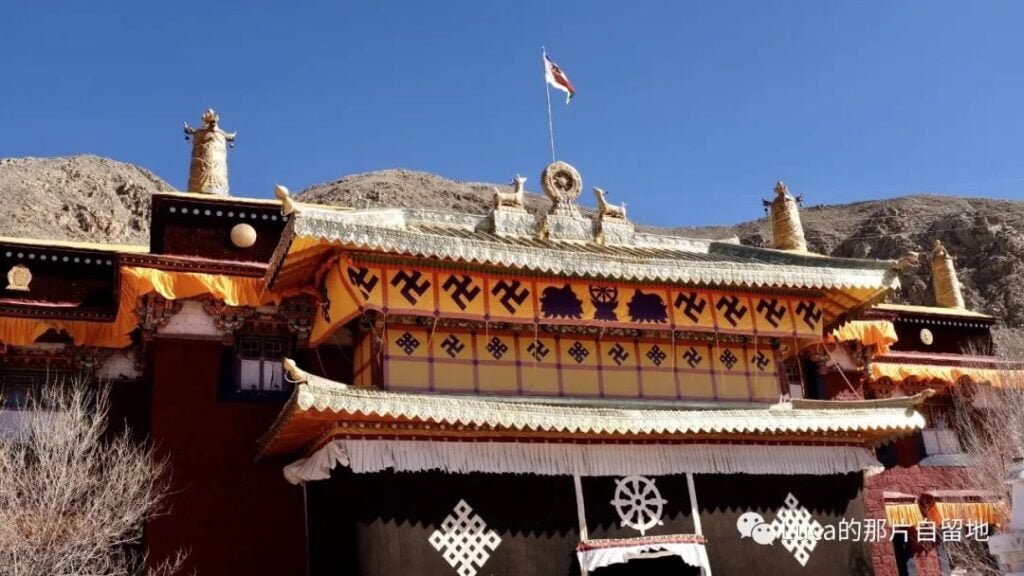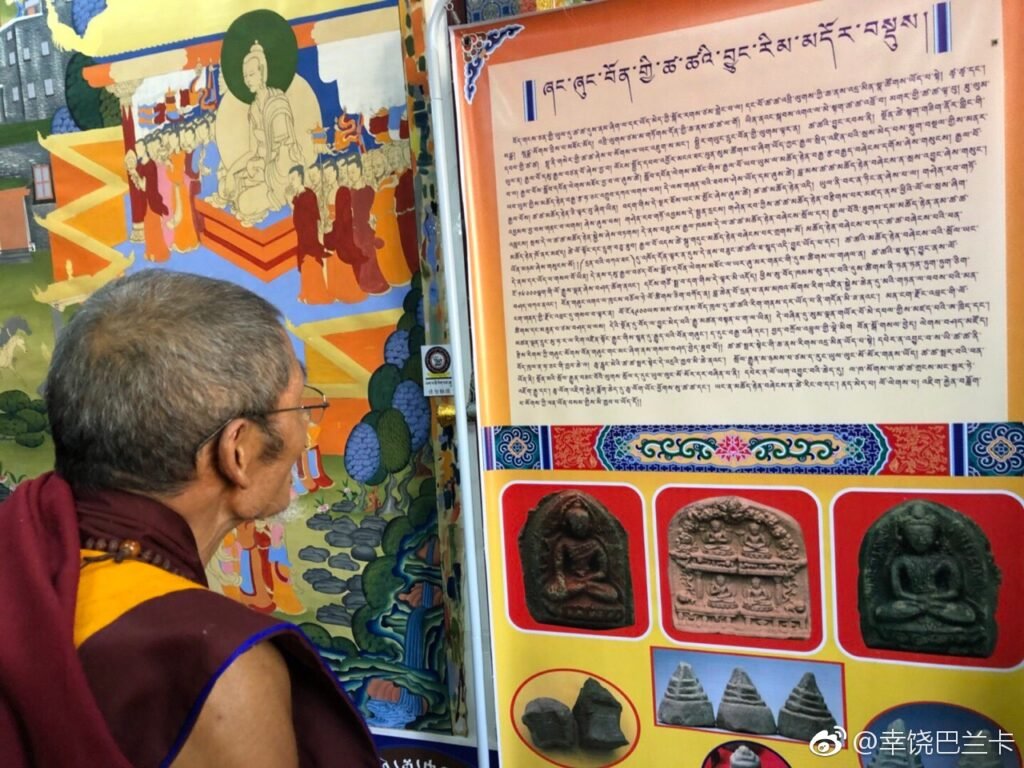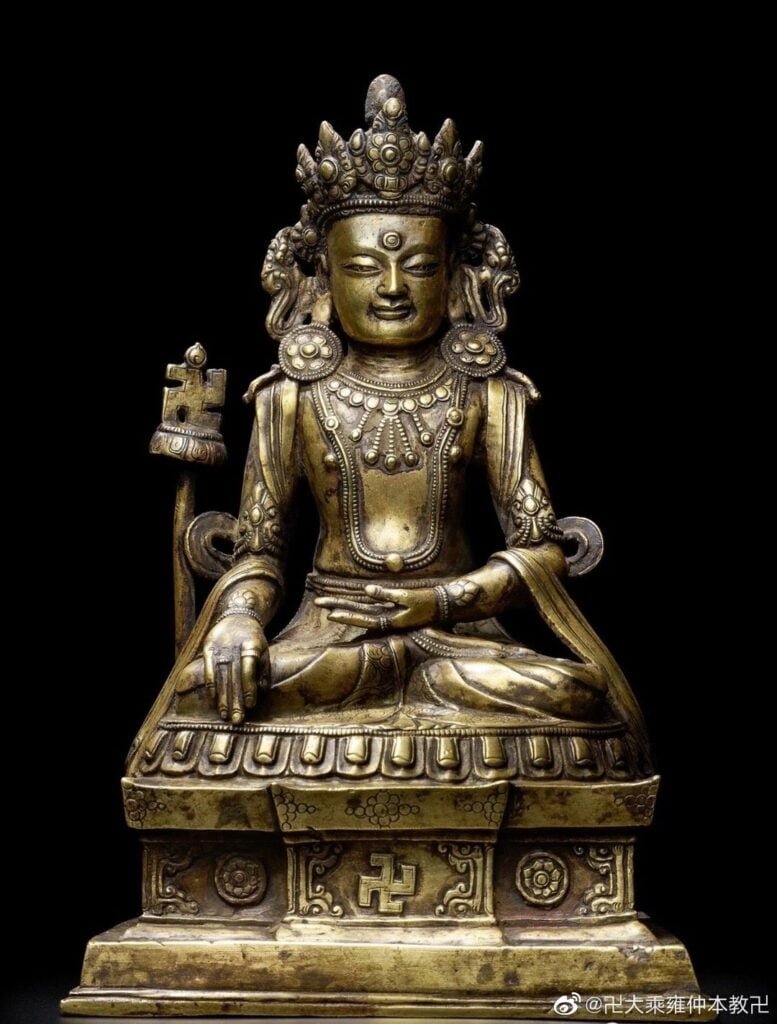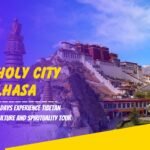The Bon religion venerates Lord Shenrab Miwoche as its illustrious founder, a significant figure from the Zhang Zhung Kingdom, Olmo Lungring. This tradition represents Tibet’s oldest spiritual teachings and is among the oldest in the world. Shenrab Miwo’s teachings, known as the “Ancient Zhang Zhung teachings,” are considered supremely sacred within the ancient Zhang Zhung culture. Lord Shenrab Miwoche, born into royalty, transcended his princely duties to pursue a higher calling. He dedicated his life to spreading the wisdom of the Yungdrung Bon, aiming to enlighten others and alleviate suffering. The term Yulin, known as “Shambhala” in Sanskrit, holds a revered place in Tibetan Buddhist lore as well.
The Meaning Behind the Name of lord Shenrab Miwoche
The name “Shenrab Miwo” carries profound symbolism. “Shen” comes from one of the ancient Zhang Zhung’s six great clans, indicating his noble lineage. “Rab” signifies supreme excellence and unparalleled greatness. “Miwo” translates to a great sage or extraordinary saint, thus making “Shenrab Miwo” denote a master and saint of the Shen clan. He was born under auspicious circumstances on the fifteenth day of the first lunar month in the realm of Olmo Lungring.
Lord Shenrab Miwo revolutionized ancient religious practices by founding the Yungdrung Bon, the original Bon religion. Following its establishment, he first devised the Zhang Zhung scripts and imparted knowledge in the five sciences: craftsmanship, linguistics, medicine, astrology, and logic. These disciplines form the core of the Bon culture, leading to the flourishing of the ancient Zhang Zhung civilization centered around the teachings of Yungdrung Bon. This religion, with its ancient roots and widespread influence, has profoundly shaped the formation and development of Tibetan culture.

Miraculous Birth and Early Signs of Greatness
The birth of the prince was marked by miraculous events: the universe was illuminated, hundreds of birds sang harmoniously, celestial music played, and flowers fell from the sky, signaling a new era. Upon touching the ground, lotus flowers sprang up where he stepped, a sign of his sacred nature.
At the age of thirty-one, Lord Shenrab Miwo made a monumental decision to renounce his royal duties and luxurious life. He left his home to seek ultimate enlightenment. He embarked on a solitary retreat in the beautiful Meru Garden, where through meditation, he achieved spiritual ascendance.
Throughout his life, he faced opposition from the demon, a formidable adversary who sought to undermine his spiritual endeavors. Despite these challenges, Lord Shenrab’s efforts to disseminate the teachings of the Bon religion were relentless, demonstrating his unwavering dedication to his cause. In a remarkable turn of events, this demon eventually converted and became a disciple of Lord Shenrab, illustrating the transformative power of compassion and wisdom.

The Formation of a Spiritual Community
Lord Shenrab’s journey once led him to the western regions of what is now Tibet, in pursuit of the aforementioned demon and the recovery of stolen horses. This visit marked his only physical presence in Tibet, where he provided some instructions on ceremonial practices. However, he observed that the people were not yet prepared to fully embrace his teachings. Before departing Tibet, he foretold a time when the conditions would be ripe for his teachings to flourish in the land, ensuring the continuation of his spiritual legacy.
Guru Shenrab preached that true happiness comes from abandoning temporary pleasures for the sake of lasting joy. He illustrated this by physically separating himself from his former life, including his family and kingdom, to live in seclusion, adopting a strict vegetarian diet and engaging in continuous meditation. His profound commitment deeply impressed even his adversaries, leading them to convert to his teachings and repent their past actions.
Embracing Solitude and Enlightenment
From the ages of 46 to 60, Lord Shenrab Miwo retreated to the serene Nine-Story Forest of Yungdrung, distancing himself from the chaos of worldly life to enjoy the tranquility of nature. It was here that he imparted the profound teachings of the Great Perfection (Dzogchen), the ultimate shortcut to enlightenment, to intellectually gifted students like Chabdo Dobsang, and simpler, gradual paths to those with less understanding.

Comprehensive Teachings for All of Lord Shenrab Miwoche
During this period, Guru Shenrab laid out the Great Perfection teachings and formulated twelve crucial texts, providing a detailed roadmap for reaching enlightenment through various stages of practice. He also established the Forest Monastery, dedicating himself to rigorous meditation in solitude, akin to a wounded animal seeking refuge, thereby embodying the essence of truth-seeking.
Culmination of Virtuous Teachings
From 61 to 75, Lord Shenrab elucidated the principles of holding high views while practicing at lower stages, emphasizing the importance of the foundational Great Compassion and the practice of the Paramitas for achieving the highest sequence of enlightenment. His teachings during this time represented the culmination of the Mahayana path, detailing the origins and future of the material world and the Bon tradition.
The Final Nirvana
At 81, Guru Shenrab made the ultimate vow, dedicating all his meritorious deeds for the attainment of supreme enlightenment. Despite demonstrating sickness to teach the impermanence of life to his disciples, he miraculously recovered, reaffirming the truth of his teachings. He left his final words, indicating that although he would pass from this world, his teachings would remain timeless. Guru Shenrab entered into Parinirvana at the age of 82, leaving behind a legacy of wisdom and compassion.

Legacy and Continuation of Teachings of lord Shenrab Miwoche
Following Guru Shenrab’s departure, his disciples faced disagreements on how to honor his remains. It was decided that his body would be cremated in a golden casket, followed by a grand funeral ceremony that showcased his eighteen great deeds. The relics were divided among his followers, ensuring his teachings and blessings continued to inspire.
Spreading the Dharma
In the years following, Guru Shenrab’s successor and other great masters spread his teachings across various lands, including India, Central Asia, and Tibet, ensuring the propagation of the Yungdrung Bon tradition worldwide. These efforts marked the beginning of a new chapter in the dissemination of his profound wisdom.






The biographies of Lord Tonpa Shenrab Miwoche, the revered founder of the Bon religion, provide deep insights into his life and teachings. These texts are crucial for understanding the spread and influence of Bon across Tibet and beyond.

The Threefold Biography lord Shenrab Miwoche
- Manifestation of the Aphorism: The earliest and most concise of the three biographies, this text serves as an introduction to the profound wisdom and spiritual journey of Lord Tonpa Shenrab. Rediscovered as Termas in the 10th and 11th centuries, it lays the foundational narrative for his teachings.
- Dazzling Eyes: Spanning two volumes, this biography delves deeper into the life and spiritual legacy of Lord Shenrab. Also revealed as Termas, these texts offer a more detailed exploration of his teachings and their impact.
- Magnificent: This extensive twelve-volume work provides the most comprehensive account of Lord Shenrab’s life. Known as an oral biography, it was dictated to Rodin Ningbo in the 14th century, offering unparalleled insights into the spiritual and historical significance of Lord Shenrab’s teachings.
Following the tradition of oral transmission, the Oral Biography was dictated after divine interventions marked by miraculous signs, such as wooden stairs descending from the heavens in Ormo Long. This signified the divine sanction for the systematization and classification of Lord Shenrab’s teachings, a task undertaken by Mu Qiao Demu after the divine message was delivered through the Shen Luo Ba language.

Major Contributions of Lord Shenrab Miwoche
- Founding the Yungdrung Bon: Guru Shenrab established the Yungdrung Bon, laying the groundwork for what would become Tibet’s indigenous spiritual path, predating even the introduction of Buddhism to Tibet.
- Creation of Zhang Zhung Scripts: He developed the Zhang Zhung scripts, an essential contribution to preserving and transmitting the teachings.
- Teaching the Five Sciences: His instruction on the “Five Sciences” further enriched the spiritual and intellectual landscape of his followers.

The Legacy and Spread of Bon Teachings
Muche Demu played a pivotal role in organizing and disseminating Lord Shenrab’s teachings. Among his disciples, the Six Great Masters or “VI Decorations” stand out for their contributions to translating the Bon texts and spreading the religion in their native lands. These masters hailed from diverse regions, each bringing unique perspectives and linguistic skills to the translation and propagation of the Bon teachings:
- Mutsa Takhe, Tritok Partsa, and Huli Paryag from Tagzig (believed to be ancient Zhang Zhung or West Tibet),
- Lhadag Ngagdo from India,
- Letang Mangbo from China,
- Sertok Chejam from Trooma.
Their efforts ensured that the wisdom of Lord Tonpa Shenrab Miwoche was accessible to a wide audience, transcending cultural and linguistic barriers. Through their translations and teachings, the profound messages of the Bon religion found new homes and hearts, enriching spiritual practices across Asia.
This rich tapestry of biographies and the dedicated work of Lord Shenrab’s disciples highlight the enduring legacy of his teachings and the universal appeal of the Bon religion. It underscores the significance of spiritual wisdom transcending time and geography, continuing to inspire and guide seekers on their path to enlightenment.
Major Contributions of lord Shenrab Miwoche
- Founding the Yungdrung Bon: Guru Shenrab established the Yungdrung Bon, laying the groundwork for what would become Tibet’s indigenous spiritual path, predating even the introduction of Buddhism to Tibet.
- Creation of Zhang Zhung Scripts: He developed the Zhang Zhung scripts, an essential contribution to preserving and transmitting the teachings.
- Teaching the Five Sciences: His instruction on the “Five Sciences” further enriched the spiritual and intellectual landscape of his followers.





